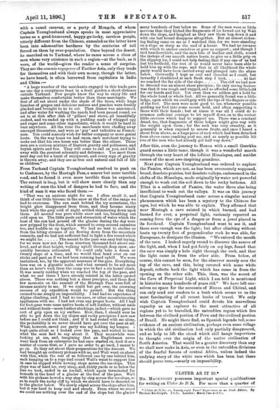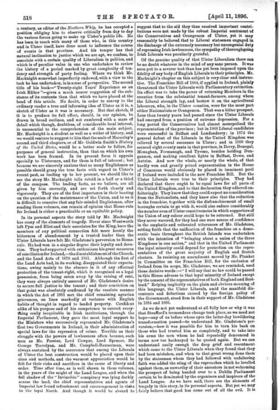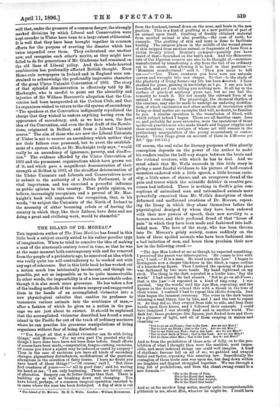ULSTER AS IT IS.*
Mn. Macxxicarr possesses important special valifacation* for writing on Ulster As It Is. For more than a quarter of • Ulster As It Is; or, Twenty eight Tsars' Expsr.enca as an insh Bailor. By Thomas Id acknight. 2 v.1... London: Macm-Ilau sod 03. a century, as editor of the Northern Whig, he has occupied a position obliging him to observe critically from day to day the various forces going to make up Ulster's public life. He has been in touch with many of those who, in this country and in Ulster itself, have done most to influence the course of events in that province. And his temper has that natural inclination to justice which we are apt, we confess, to associate with a certain quality of Liberalism in politics, and which is of peculiar value in one who undertakes to review the history of a period marked by great complexity of ten- dency and strength of party feeling. Where we think Mr. Macknight somewhat imperfectly endowed, with a view to the task he has undertaken, is in sense of perspective. The second title of his book—" Twenty-eight Years' Experience as an Irish Editor "—gives a much nearer suggestion of the sub- stance of its contents than that which we have placed at the head of this article. No doubt, in order to convey to the ordinary reader a true and informing idea of Ulster as it is, a sketch of Ulster as it was is necessary. But that sketch, if it is to produce its fall effect, should, in our opinion, be drawn in broad outlines, and not cumbered with a mass of -detail which though, doubtless, of considerable local interest, is unessential to the comprehension of the main subject. Mr. Macknight is a student as well as a writer of history, and we would venture to suggest to him that the scale of Macaulay's second and third chapters, or of Mr. Goldwin Smith's History 4#* the United States, would be a better scale to follow, for purposes of general instruction, than that on which his own work has been framed. In its present form it appeals specially to Ulstermen, and for them is fall of interest ; but because we are sincerely anxious that as many Englishmen as possible should grasp the true facts with regard to Ulster's recent past, as leading up to her present, we should like to see the story Mr. Macknight tells retold in a half or a third -of the compass. The leading facts, as we believe, are all given by him correctly, and are set forth clearly and vigorously. They are of the first importance in their bearing on the question of the maintenance of the Union, and to us it is difficult to conceive that any fair-minded Englishman, after reading these volumes, can remain of opinion that Home-rule for Ireland is either a practicable or an equitable policy.
In its personal aspects the story told by Mr. Macknight has many of the elements of tragedy. Never since Wentworth left Pym and Eliot and their associates for the King, have the members of any political connection felt more keenly the bitterness of abandonment by a trusted leader than the Ulster Liberals have felt Mr. Gladstone's perversion to Home- rule. He had won in a singular degree their loyalty and devo- tion. They had supported with enthusiasm his great measures of conciliation for Ireland,—the disestablishment of the Church, and the Land Acts of 1870 and 1831. Although the first of he Land Acts had, in its working, disappointed their expecta- tions, owing mainly to the absence in it of any effectual protection of the tenant-right, which it recognised as a legal possession, from being eaten away by the raising of rent, they were always entirely assured of Mr. Gladstone's desire to secure full justice to the tenant ; and their conviction on that point was absolutely confirmed by the resolute manner in which the Act of 1881 met the chief remaining agrarian grievances, on lines markedly at variance with English habits of thought in regard to landed property. Confident alike of his purpose and of his competence to correct every. thing really inequitable in Irish institutions, through the Imperial Parliament, they gave the most loyal support to the Ministers who successively represented Mr. Gladstone's first two Governments in Ireland, in their administration of special laws for the repression of crime. Terrible as their struggle with the powers of lawlessness often became, such men as Mr. Forster, Lord Cowper, Lord Spencer, Sir 'George Trevelyan, and Mr. Campbell-Bannerman, were always sustained by the assurance that among the Liberals of Ulster the best construction would be placed upon their aims and methods, and the warmest appreciation would be felt for their risks and sacrifices in the cause of liberty and order. Time after time, as is well shown in these volumes, in the years of the might of the Land League, and when the fell shadow of the " Invincible " conspiracy was lying darkly across the land, the chief representatives and agents of Imperial law found refreshment and encouragement in visits to the loyal North. And though it would be absurd to suggest that to the aid they thus received important contri- butions were not made by the robust Imperial sentiment of the Conservatives and Orangemen of Ulster, yet it may reasonably be believed that to Liberal statesmen engaged in the discharge of the extremely necessary but uncongenial duty of repressing Irish lawlessness, the sympathy of thoroughgoing Irish Liberals was peculiarly grateful.
Of the genuine quality of that Ulster Liberalism there can be no doubt whatever in the mind of any sane person. It was soon put to a severer test than has yet been imposed upon the fidelity of any body of English Liberals to their principles. Mr. Macknight's chapter on this subject is very clear and instruc- tive. The Franchise Bill of 1884, if applied to Ireland, plainly threatened the Ulster Liberals with Parliamentary extinction. Its effect was to take the power of returning Members in the counties from the substantial tenant-farmers, among whom the Liberal strength lay, and bestow it on the agricultural labourers, who, in the Ulster counties, were for the most part either Nationalists or Orangemen. That was a bitter prospect. Less than twenty years had passed since the Ulster Liberals had emerged from a position of extreme depression. For a long period the Conservatives had almost monopolised the representation of the province; but in 1868 Liberal candidates were successful in Belfast and Londonderry ; in 1874 the general defeat of the Liberals in the United Kingdom was relieved by several successes in Ulster ; and in 1880 they secured eight county seats in that province, in Derry, Donegal, Monaghan, Fermanagh, and Tyrone, besides holding Dun- gannon, and making excellent fights in Belfast, Down, and Antrim. And now the whole, or nearly the whole, of that hardly won and greatly prized representation in the House of Commons would obviously be placed in imminent peril if Ireland were included in the new Franchise Bill. But the Ulster Liberals were true to their principles. They had declared that there ought to be equal laws for all parts of the United Kingdom, and to that declaration they adhered un- falteringly. They knew that they could expect no consideration from the Nationalists, and they knew also that the reduction in the franchise, together with the disfranchisement of small boroughs certain to go with it, would also reduce considerably the number even of Ulster constituencies in which supporters of the Union of any colour could hope to be returned. But still they never wavered, for they had one sure source of confidence in the emphatic and reiterated utterances of Mr. Gladstone, setting forth that the unification of the franchise on a demo- cratic basis throughout the British Islands was undertaken with the intention of "bringing about a union of the three Kingdoms in one nation," and that in the United Parliament the loyal minority could depend for protection on the repre- sentatives of the great majority of English and Scotch electors. In resisting an amendment moved by Mr. Plunket in Committee on the Franchise Bill, for the exclusion of Ireland from its scope, Mr. Gladstone, we are reminded, used these decisive words :—" I will say that no law could be passed in this House adverse to that loyal minority of Ireland except by the consent of the representatives of both England and Scot- land." Relying implicitly on the plain and obvious meaning of this language, the Ulster Liberals, amid the manifold dis- contents and defections caused by the foreign policy of the Government, stood firm in their support of Mr. Gladstone in 1884 and 1885.
As we do not yet understand at all fully how or why it was that Strafford's tremendous change took place, so we need not hope—any of us before whose eyes the latter-day bewildering transformation passed—to understand Mr. Gladstone's tier- version,—how it was possible for him to turn his back on those who had trusted him so completely, and to take into his arms the men whom he had repeatedly denounced in terms now too hackneyed to be quoted again. But we can understand easily enough the deep grief and resentment which came to the Ulster Liberals when they found that they had been mistaken, and when to that great wrong done them by the statesman whom they had followed with unfaltering faith was added the sting of the reproaches which he levelled against them, as unworthy of their ancestors in not welcoming the prospect of being handed over to a Dublin Parliament certain to be dominated by the organisers and inspirers of the Land League. As we have said, there are the elements of tragedy in this story, in its personal aspects. But yet we may fairly believe that good has come out of all the evil. It is
well that, under the pressure of a common danger, the strongly marked divisions by which Liberal and Conservative were kept asunder in Ulster have been to a large extent obliterated. It is well that they have been brought together in common efforts for the purpose of averting the disaster which has twice impended over them. They understand one another now, and recognise each other's merits, as they might have failed to do for generations if Mr. Gladstone had remained on the old lines of Liberal policy. And their whole-hearted combination has profoundly affected British thought. Even Home-rule newspapers in Ireland and in England were con- strained to acknowledge the profoundly impressive character of the great Ulster Unionist Convention of 1892. The story of that splendid demonstration is effectively told by Mr. /lIfacknight, who is careful to point out the absurdity and injustice of Sir William Harcourt's allegation that the Con- vention had been inaugurated at the Carlton Club, and that its organisers wished to return to the old system of ascendency. "The speakers at the Convention indignantly repudiated the charge that they wished to restore anything having even the appearance of ascendency, and, as we have seen, the first idea of the Convention, and even the first draft of the Resolu- tions, originated in Belfast, and from a Liberal Unionist source." The aim of those who are now the Liberal Unionists a Ulster is not to recover an ascendency which neither they nor their fathers ever possessed, but to avert the establish- ment of a system which, as Mr. Macknight truly says, "would really be an ascendency of ignorance, poverty, and disaffec- tion." The evidence afforded by the Ulster Convention of 1892 and the permanent organisations which have grown out of it, and which gave a magnificent demonstration of their strength at Belfast in 1893, of the steadfast determination of the Ulster Unionists and Liberals and Conservatives never to submit to the authority of a Dublin Parliament, is of vital importance, and has exercised a powerful influence on public opinion in this country. That public opinion, we believe, increasingly recognises, and a perusal of Mr. Mac- knight's book will emphasise the recognition, that, in his words, "to subject the Unionists of the North of Ireland to the necessity of either becoming rebels or of leaving the country in which they, like their fathers, have done and are doing a great and civilising work, would be shameful."




































 Previous page
Previous page